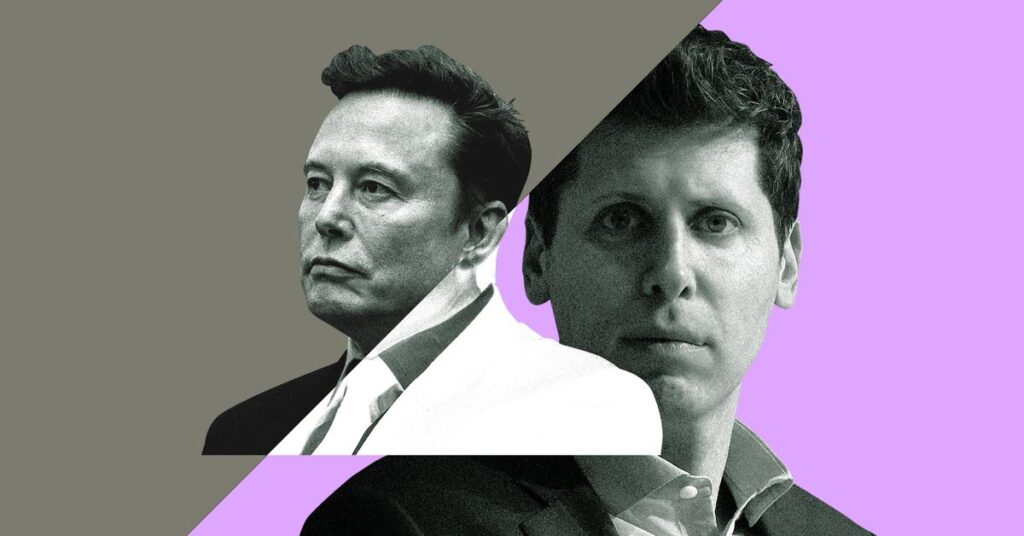As OpenAI was ironing out a new deal with Microsoft in 2016 — one that would nab the young startup critical compute to build what would become ChatGPT — Sam Altman needed the blessing of his biggest investor, Elon Musk.
“$60MM of compute for $10MM, and input from us on what they deploy in the cloud,” Altman messaged Musk in September 2016, according to newly revealed emails. Microsoft wanted OpenAI to provide feedback on and promote (in tech circles, “evangelize”) Microsoft AI tools like Azure Batch. Musk hated the idea, saying it made him “feel nauseous.”
Altman came back with another offer: “Microsoft is now willing to do the agreement for a full $50m with ‘good faith effort at OpenAI’s sole discretion’ and full mutual termination rights at any time. No evangelizing. No strings attached. No looking like lame Microsoft marketing pawns. Ok to move ahead?”
“Fine by me if they don’t use this in active messaging,” Musk responded. “Would be worth way more than $50M not to seem like Microsoft’s marketing bitch.”
Musk released these emails and others last week as part of a lawsuit he’s filed against OpenAI and Microsoft. They are ostensibly meant to demonstrate an anticompetitive partnership between the two companies. But primarily, they expose the details of early collaborations and power struggles between Altman and Musk, who invested between $50 million and $100 million in the earliest iteration of OpenAI. They trace OpenAI’s evolution from an open-source nonprofit to what the lawsuit calls a “closed-source de facto subsidiary” of Microsoft that abandoned its mission to develop AI for good. And they lay bare the complete and utter unraveling of Musk and Altman’s once-promising partnership.
“Elon’s third attempt in less than a year to reframe his claims is even more baseless and overreaching than the previous ones,” OpenAI spokesperson Hannah Wong wrote in a statement to The Verge. “His prior emails continue to speak for themselves.”
“Would be worth way more than $50M not to seem like Microsoft’s marketing bitch,” Musk said
Musk and Altman launched OpenAI united by fears of human-level intelligence in the hands of tech giants like Google — only to see it become the kind of tech juggernaut they feared. After winning a CEO position that Musk coveted, Altman chose to keep OpenAI’s cutting-edge AI behind closed doors, claiming it was too dangerous to be openly released. The decision incensed Musk, who left OpenAI’s board to found his own competitor, xAI. Nearly a decade after the pair founded OpenAI, the two companies are amassing billions of dollars and Musk is taking the fight to court — in a race to own what both men see as the inevitable future of computing.
“Been thinking a lot about whether it’s possible to stop humanity from developing AI,” Altman wrote in 2015 in an email to Musk as a pitch to start OpenAI. “If it’s going to happen anyway, it seems like it would be good for someone other than Google to do it first.”
The talent problem
From its inception, OpenAI was caught between two conflicting forces: an idealistic mission to benefit humanity and a cutthroat race against tech behemoths. Musk and Altman agreed that whatever their motivations, securing top talent (along with piles of cash) would be a paramount concern. This early compromise would set the stage for what Musk would later call the startup’s pursuit of profit over principle.
In 2015, the startup was known as YC AI — a lab tucked inside Y Combinator’s nonprofit research division, YCR. Altman, then president of the startup incubator, leveraged its extensive network and resources to attract researchers and money. Musk urged Altman and CTO (now president) Greg Brockman to seek over $100 million in funding, cautioning them that anything less would appear paltry compared to the deep pockets of tech giants like Google and Facebook.
“I think we should say that we are starting with a $1B funding commitment. This is real. I will cover whatever anyone else doesn’t provide,” Musk said in 2015 emails revealed by OpenAI earlier this year in response to Musk’s lawsuit.
Still, despite Musk’s support and a war chest of millions of dollars, the fledgling organization faced an early challenge that plagues most startups: the fierce competition for top talent. OpenAI might be the hottest place to work in Silicon Valley today, but a decade ago (and long before the launch of ChatGPT), many top AI researchers were unlikely to give it a second glance.
In their aggressive bid for the best AI researchers, Altman and his team devised an unusual compensation package: a base salary of $175,000, a “part-time partner” title at YC, and 0.25 percent equity in each YC startup batch. (Now, it’s more common for AI researchers to be compensated closer to $1 million annually.) Altman billed it as a “Manhattan Project for AI,” per one email to Musk, and sensed he could get many of the top 50 researchers to join and “structure it so that the tech belongs to the world via some sort of nonprofit but the people working on it get startup-like compensation.”
The goal was to assemble an elite founding team of seven to 10 members — whatever it took to win the industry’s best minds. Still, Google’s AI lab, DeepMind, was on their heels.
“DeepMind is going to give everyone in OpenAI massive counteroffers tomorrow to try to kill it,” Altman wrote to Musk in December 2015. “Do you have any objection to me proactively increasing everyone’s comp by 100-200k per year? I think they’re all motivated by the mission here but it would be a good signal to everyone we are going to take care of them over time.”
“Sounds like DeepMind is planning to go to war over this,” Altman added.
Musk approved of the salary bumps, and by February 2016, OpenAI’s founding team was offered a $275,000 salary plus YC equity, while subsequent hires received a $175,000 salary with performance-based bonuses of $125,000 or equivalent stock in YC or SpaceX. Brockman added that there were three special cases: himself, along with cofounders Ilya Sutskever and Trevor Blackwell. It was later reported that Sutskever earned more than $1.9 million in 2016, and he told The New York Times that he “turned down offers for multiple times the dollar amount” he accepted from OpenAI. “I don’t know what will happen if/when Google starts throwing around the numbers they threw at Ilya,” Brockman wrote to Musk as he outlined a plan to poach researchers.
“We need to do what it takes to get the top talent. Let’s go higher. If, at some point, we need to revisit what existing people are getting paid, that’s fine,” Musk replied. “Either we get the best people in the world or we will get whipped by DeepMind. Whatever it takes to bring on ace talent is fine by me.” He warned that a victory by DeepMind, which was causing him “extreme mental stress,” would be really bad news with their “one mind to rule the world” philosophy. “They are obviously making major progress and well they should, given the talent level over there,” Musk added.
AGI dictatorship
It didn’t take long for things to get contentious between the cofounders.
In August 2017, OpenAI was ironing out the specifics of an initial funding round of between $200 million and $1 billion. Shivon Zilis, an ex-OpenAI board member and Neuralink operations director who would later bear three of Musk’s 12 children, wrote to Musk that Brockman and Sutskever were concerned. They were worried about how a newly founded for-profit branch of OpenAI would distribute equity and control as well as whether Musk — who wanted the job of CEO there — would commit sufficient time to it. “This is very annoying,” Musk responded, according to one of the newly released emails. “Please encourage them to go start a company. I’ve had enough.”
The next month, Sutskever and Brockman escalated with a joint email to Musk and Altman. They expressed fears that Musk would seize “unilateral absolute control” over artificial general intelligence (AGI) if he took power as CEO. At the same time, they questioned Altman’s motivations, asking why “the CEO title is so important” to him. “Is AGI truly your primary motivation? How does it connect to your political goals? How has your thought process changed over time?” the pair asked. (The email doesn’t elaborate on what “politics” refers to, but Altman had become vocally active in California political campaigning earlier that year.) They said that they had let the promise of money cloud their judgment during earlier negotiations, blinding them to concerns they should have raised.
“The goal of OpenAI is to make the future good and to avoid an AGI dictatorship. You are concerned that [DeepMind CEO Demis Hassabis] could create an AGI dictatorship. So do we,” the pair wrote. “So it is a bad idea to create a structure where you could become a dictator if you chose to, especially given that we can create some other structure that avoids this possibility.”
The email echoed a common refrain from OpenAI’s founders: that superintelligent AI was a serious threat to humanity, and any single entity controlling that power was even greater. But Musk was unimpressed.
“It is a bad idea to create a structure where you could become a dictator if you chose to,” Sutskever told Musk
“I will no longer fund OpenAI until you have made a firm commitment to stay or I’m just being a fool who is essentially providing free funding for you to create a startup. Discussions are over,” Musk replied. Altman replied that he remains “enthusiastic about the non-profit structure,” which ultimately led Sutskever and Brockman to back down.
Shortly after the confrontation, Zilis relayed a conversation she had with Altman to Musk. Zilis revealed that Altman “admitted that he lost a lot of trust with Greg and Ilya through this process” and “felt their messaging was inconsistent and felt childish at times.” Altman decided to take 10 days off to process the incident, Zilis added, because he “needs to figure out how much he can trust them and how much he wants to work with them.”
Just five months after Brockman and Sutskever’s email expressing fears of a power struggle, the situation reached another inflection point. In an altercation that was reported years later, Musk became convinced OpenAI had fallen irreparably behind Google and proposed taking control of the company himself — the very scenario Brockman and Sutskever had cautioned against.
“My probability assessment of OpenAI being relevant to DeepMind/Google without a dramatic change in execution and resources is 0%. Not 1%. I wish it were otherwise,” Musk said in 2018, per emails revealed by OpenAI earlier this year.
OpenAI’s leadership rejected his offer, and Musk departed the board in February 2018, cutting off funding but continuing to offer his support as an adviser.
Photo by Allison Robbert-Pool / Getty Images
The loss of Musk, who had by that point reportedly invested $100 million, put OpenAI’s nonprofit model in peril. When Musk was still largely bankrolling the operation in 2017, Zilis explained to him that OpenAI leadership wanted to raise “$100M out of the gate” because “they are of the opinion that the datacenter they need alone would cost that.” So, in 2019, desperate to fund the training data center and reduce reliance on Musk, the team crafted a unique structure: a capped for-profit company controlled by the nonprofit. LinkedIn cofounder Reid Hoffman and venture capitalist Vinod Khosla participated in the first funding round, which secured pledges of nearly $1 billion but a far smaller initial funding of $130 million.
In March 2019, Musk sent Altman an article that implied his involvement in the new for-profit structure. “Please be explicit that I have no financial interest in the for-profit arm of OpenAI,” Musk said in the email, which he would later submit for inclusion in the suit. Altman responded simply: “On it.”
Etched in OpenAI’s history
OpenAI wields immense influence and power in the AI industry, and the battle for control was not lost on either Musk or Altman. In the end, Altman emerged victorious — then consolidated his power into near-total control over OpenAI.
The legal merits of Musk’s case are questionable. While he’s accused OpenAI and Microsoft of myriad offenses, much of his suit boils down to accusing Altman of hypocrisy, not typically something that’s punished in a court of law. The case is being heard in California, not in Texas, where Musk has been able to count on a sympathetic ear from a Tesla-stock-owning judge. Still, a lawsuit that accuses OpenAI and Microsoft of anticompetitive practices could garner sympathy while Musk has the ear of US president-elect Donald Trump.
But whatever its outcome, the suit gives Musk a chance to reveal details that shape the narrative of OpenAI’s origins and his own role. The exhibits show Altman securing power in the company’s early days, perhaps despite the wishes of his cofounders. They underline Altman’s willingness to go toe-to-toe with his for-profit competitors from the beginning. And they provide the public with a clear picture of what powers OpenAI: Altman’s willingness to do whatever it takes to get what he wants.
How complete is this narrative? We don’t know. It’s likely a lot of important conversations happened offline or in emails that aren’t included. And Musk, obviously, isn’t any less power-hungry; if anything, this suit demonstrates his sheer petty desire to retaliate when slighted. But as both leaders are competing for a finite amount of venture capitalist cash, he may be betting that he can tear down Altman’s reputation — and cement himself as the rightful steward of AGI.


